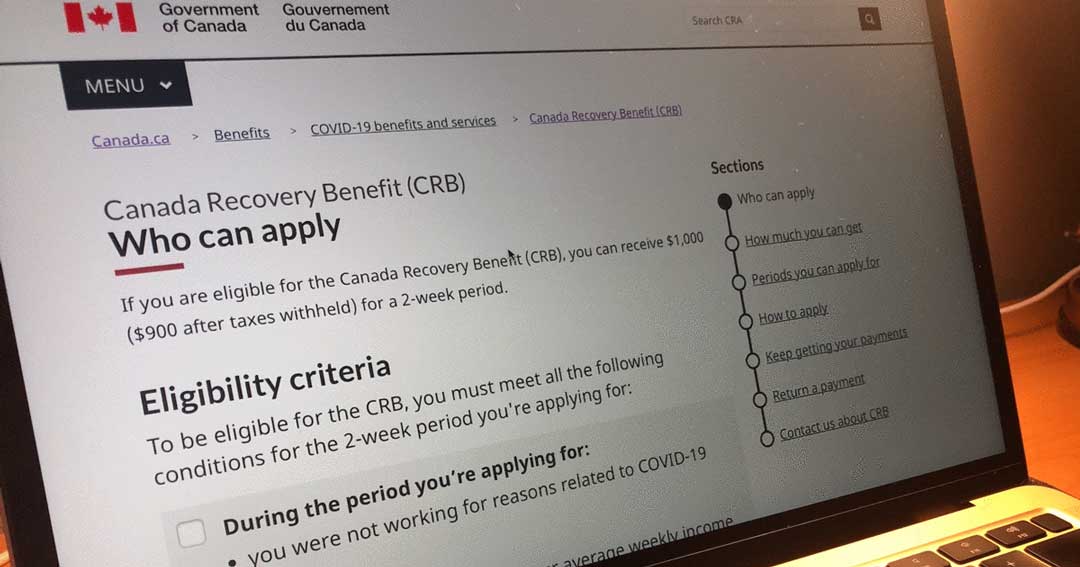
The Canada Revenue Agency (CRA) launched the Canada Emergency Response Benefit (CERB) as the flagship COVID-19 program by the Canadian government in 2020. CERB became a lifeline for Canadians who lost income due to the pandemic. The program ended on September 27, 2020, and made way for CERB replacements.
The federal government revamped the Employment Insurance (EI) system and introduced the Canada Recovery Benefit (CRB) to transition Canadians still in need of financial aid. With no visible end to the pandemic, despite hopeful developments on the vaccine front, the government announced two major updates for EI and CRB.
Maximum duration
Many CRB recipients are due to exhaust their benefits on March 27, 2021. The government’s announcement to update CRB and EI came right on time. One of the changes introduced by the CRA will be an extension of CRB from the original 26 weeks to 38 weeks. For regular EI benefits, the CRA has extended the period to 50 weeks for claims made between September 27, 2020, and September 25, 2021.
The federal government also extended the Canada Recovery Caregiving Benefit (CRCB) and Canada Recovery Sick Benefit (CRSB). The CRCB duration is also 36 weeks after the update, while the CRSB has been extended from two to four weeks.
CRA cash benefit amount
The CRA pays $1,000 for each two-week CRB eligibility period, which is actually $900 after the 10% withholding tax is deducted at the source. For self-employed individuals who prefer access to their EI benefits through Service Canada, the government has reduced the self-employed income threshold (for 2020 earnings) from $7,555 to $5,000.
You can earn income while you receive CRB, provided that your annual income for the calendar year will not go over $38,000. You will need to pay 50% of each dollar of your income that goes above $38,000.
If you qualify for the EI benefit, the minimum amount you can receive per week is $500 (subject to a 10% tax on payment), but some people may be eligible to receive up to $573 per week, depending on their previous income. The proceeds for both CRSB and CRCB are $450 per week (subject to a 10% withholding tax upon payment).
Source: CRA
Newsletters
No Results Found
The page you requested could not be found. Try refining your search, or use the navigation above to locate the post.
Events & Sponsorship
No Results Found
The page you requested could not be found. Try refining your search, or use the navigation above to locate the post.
Articles & Publications
Changes to RRSP and CPP in 2021
The Canada Revenue Agency (CRA) has made annual announcements about the nation’s retirement programs. Namely, the Canada Pension Plan (CPP) and the Registered Retirement Savings Plan (RRSP) are being updated as we enter the new year. Here are the changes you need to...
CRA Collection Letters for CERB Ineligibility & Repayment
The Canada Revenue Agency has begun issuing formal collection letters for CERB repayment to recipients who may or may not have been eligible for the payments they received. You may have received a letter from CRA regarding CERB payments to be paid back along with one...
TFSA limit for 2021 released
The TFSA new contribution limit for 2021 has been officially released. That limit is $6,000, matching the amount set in 2019 and 2020. With this TFSA dollar limit announcement, the total contribution room available in 2021 for someone who has never contributed and has...
CERB has ended, here is what to know about your benefits
After providing millions of Canadians with financial relief since the beginning of the pandemic, the Canada Emergency Response Benefit (CERB) will be coming to an end on Saturday and recipients will be forced to transition to a recently updated Employment Insurance...
CRA Warning: Pay Your Taxes on the CERB!
The Canada Revenue Agency (CRA) might have helped you through the lockdown if you lost your job due to COVID-19. The federal government initially announced the Canada Emergency Response Benefit (CERB) that would see qualifying Canadians receive $2,000 per month over...